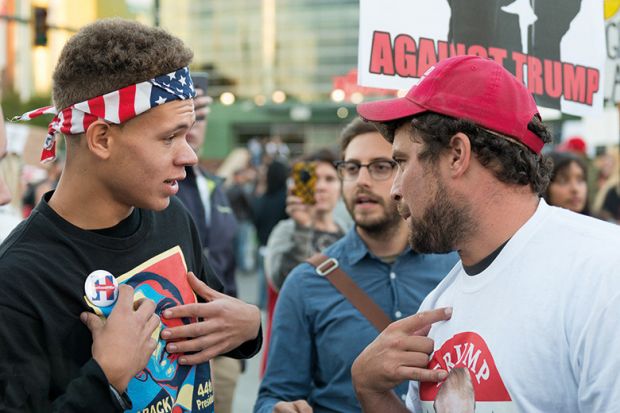Politics has always been vicious. “War without bloodshed,” Chairman Mao called it, but Theresa May has seen a chance for a political bloodletting at least, calling a snap election in June that promises to significantly increase the Conservatives’ parliamentary majority and could rout Labour altogether.
If the polls are correct this time, the UK general election will continue the trend of a resurgent Right, which has also emerged victorious from the bloody battlefields of Brexit and Trump.
The civil war resulting from this polarisation of political debate has arguably skirted around campus walls. Universities are remarkably homogeneous when it comes to the politics of their staff and students. Indeed, the dominance of the Left has become a point of great contention, not only among those who want their own perspective better represented, but within universities too.
Many were left wringing their hands about academics’ inability to influence the voting public in 2016, fearing it was evidence of a dislocation from society at large.
In our features pages this week, we hear from someone with an unusual perspective on these issues. Daniel Bonevac is a rare thing: a tenured professor at a leading US university who is also a card-carrying supporter of President Donald Trump.
In our interview, he makes the case for Trump from the perspective of a philosopher whose expertise is in logic and ethics. Some of his case is familiar enough. He explains how he came to believe that Trump was the only candidate in last year’s election who offered hope to the blue-collar communities Bonevac grew up in, and who would tackle the “monstrous bureaucracy” of Washington.
But other aspects are less well rehearsed. He argues that the mantra of “America first” is not crude nationalism but a commitment to Western political ideals as “the world’s best hope”.
And he suggests that while Trump’s relationship with fact and fiction may be troubling, his inaccuracies and falsehoods are often “expressing some deep truth”.
Elsewhere in the interview, Bonevac addresses another of the narratives about higher education that has taken hold: that campuses have become places that are not only starved of alternative political perspectives, but that have become actively intolerant of them.
Whether or not you agree with Bonevac about Trump, the question of why the political Right is so under-represented in academia is an important one.
Is it something about the environment or lifestyle? The reliance on intrinsic motivation, perhaps, or the salaries on offer and the time it can take to rise through the ranks? Perhaps there’s an element of birds of a feather flocking together, or could there be something inherently more academic about a left-leaning mindset?
Whatever the reasons, it’s increasingly common to hear the argument that academia must change if it is to live up to John Henry Newman’s ideal, which puts pluralism at the heart of the university.
Students, Newman said, must be taught to “think and to reason and to compare and to discriminate and to analyse”. Dogmatism is no substitute for analysis, whether it comes from the Left or Right.
Writing recently in Times Higher Education , Musa al-Gharbi, a fellow in sociology at Columbia University and research associate with the Heterodox Academy, argued that “ideological homogeneity poses an existential threat to the integrity, credibility, utility and even viability of social research”.
Unless more conservative voices are admitted, he warned, politicians from the prevailing Right will increasingly ignore and even defund social science.
If there’s a broader lesson for universities from the events of the past 12 months, it is perhaps that they have to be better at detecting changes in the air they breathe, and that one way or another this must be the same smoggy concoction as the rest of society, rather than some filtered or rarefied blend.
As Bonevac puts it: “Something is lost if [we only hear] the arguments on the Left, and almost none of the intelligent arguments on the Right. The last election is a good example of that – people were gobsmacked by positions and arguments that they’d just never thought through because they’d never encountered them before. A lot of this was off the intellectual radar for many people.”
Register to continue
Why register?
- Registration is free and only takes a moment
- Once registered, you can read 3 articles a month
- Sign up for our newsletter
Subscribe
Or subscribe for unlimited access to:
- Unlimited access to news, views, insights & reviews
- Digital editions
- Digital access to THE’s university and college rankings analysis
Already registered or a current subscriber?
